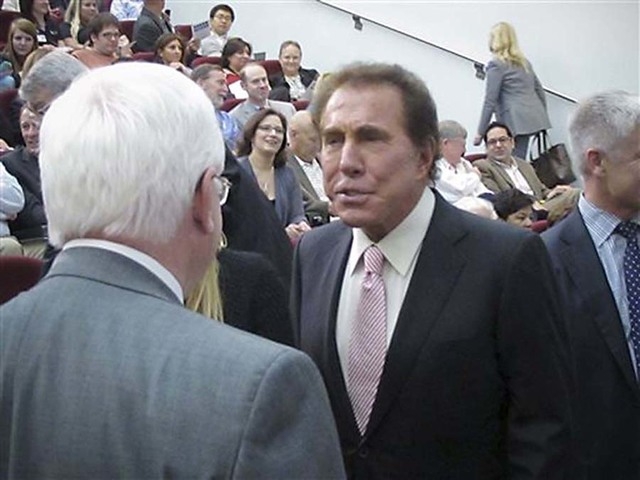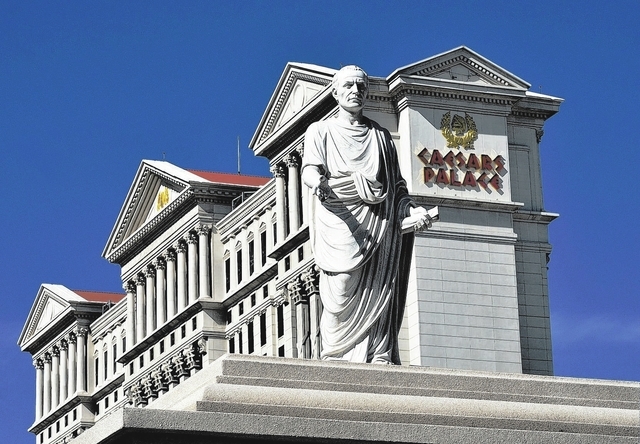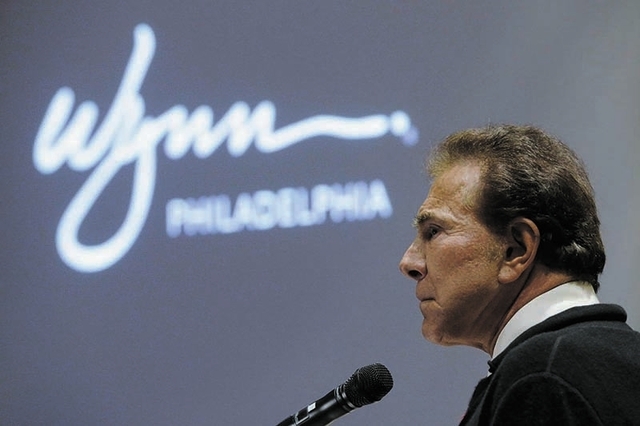Lawsuit takes aim at Mass. regulator who ‘personally asked’ Wynn to stay in hunt
Caesars Entertainment Corp. claims Massachusetts’ top gaming regulator personally asked Wynn Resorts Ltd. Chairman Steve Wynn to stay in the competition for a Boston-area casino license after the gaming executive expressed his displeasure with the process.
However, in a statement late Thursday, Wynn denied that “any member of the Massachusetts Gaming Commission ever initiated contact with me and I have never been discouraged from withdrawing from the licensing process in Massachusetts.”
In an amended complaint in a lawsuit Caesars filed last month in federal court against Massachusetts Gaming Commission Chairman Stephen Crosby, the casino operator said the regulator wanted to keep Wynn in the running for the gaming license.
Wynn, whose company was competing with a partnership between Caesars and the Suffolk Downs Race Track for the sole casino license, became incensed with questions from gaming commissioners about Macau during a public hearing in October. Wynn indicated he might withdraw his proposal to build a $1.3 billion casino in Everett, Mass.
“Notwithstanding his statutory role as the unbiased overseer of the Massachusetts gaming license application process, Crosby, in the company of another commissioner, took it upon himself to place a call to Wynn and to ask Wynn to remain in the Massachusetts licensing process,” Caesars attorneys wrote in the amended complaint filed Tuesday with the U.S. District Court in Boston.
Attorneys wrote that Caesars Chairman Gary Loveman was informed of the phone conversation by Wynn.
In his statement, Wynn said that he “must correct a serious misrepresentation” made by Loveman.
Wynn said he called Crosby first.
“During that conversation, I offered to withdraw if the commission was uncomfortable with our operations in Macau,” Wynn said. However, he was told the company would be required to present information about business and compliance procedures.
“This lawsuit and the misrepresentations included within it are a shameless, desperate attempt by Caesars to deflect attention from the serious issues raised in their investigation, including their current financial condition,” Wynn said.
Caesars believes Crosby interfered in its now-dissolved partnership with Suffolk Downs Race Track, saying the chairman’s conflict of interest and actions caused the casino giant’s departure from a proposed $1 billion Boston-area gaming complex.
Caesars sued Crosby both individually and in his role as chairman of the gaming commission. The company is seeking unspecified monetary damages and wants Crosby removed from the process.
Wynn Resorts was found suitable by the gaming commission last month, and the company filed its formal application with the state for the site. Suffolk Downs revised its application after dropping Caesars and now wants to build the casino in Revere, Mass., in partnership with the Mohegan Sun Indian tribe.
Caesars, which spent $100 million on its failed effort, claims Crosby derailed the company because he has a friendship and business partnership with one of the owners of the Wynn casino site.
Crosby disclosed the relationship last month and did not participate in the Wynn suitability hearing.
Caesars also added Karen Wells, chief of the Massachusetts gaming commission’s investigations bureau, as a co-defendant to the lawsuit.
“This lawsuit is nothing more than the act of a disappointed party who withdrew from the lawful licensing process,” commission spokeswoman Elaine Driscoll said in an emailed statement. “The allegations remain baseless, and we are confident that we will prevail.”
In the original complaint, Caesars said Wells failed to disclose to the commission that New Jersey-based Spectrum Gaming, which conducted a suitability background investigation of Caesars Entertainment for the commission, recommended that Caesars be found suitable.
Spectrum officials denied the claim, saying they did not make any recommendation in a draft report.
In the amended complaint, Caesars attorneys said David Satz, the company’s vice president of government relations, believed the casino operator was going to be found suitable following a phone conversation with Fred Gushin, Spectrum’s managing director.
“Gushin, in language that Satz recognized when Spectrum was advising a favorable recommendation, assured Satz that Spectrum had already advised the Bureau that Spectrum had found no reason to conclude that plaintiffs were unsuitable,” the lawsuit stated. “Based upon Gushin’s statements in the conversation, Satz concluded that Spectrum’s investigation and report to the bureau were complete, and that Gushin believed that the bureau would issue a recommendation of suitability with conditions as to plaintiffs.”






























